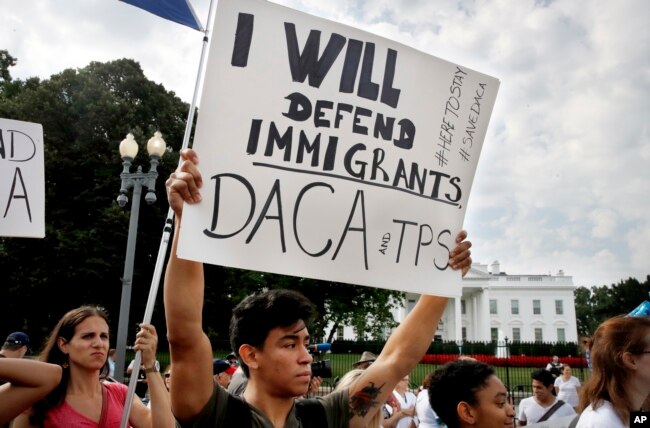voanews.com
Image from article, with caption: "Participants carry an American flag during the 4th of July parade in Santa Monica, California, July 4, 2017."
Political divisions run deep in America, but most Americans would not choose to live anywhere else, according to a new poll released Wednesday.
The new Wall Street Journal/NBC News survey of social trends showed wide-ranging divisions between Americans on issues like culture, the economy and the future of the nation, but most people agreed on one thing: America is a decent place to live.
According to the poll, 28 percent of respondents called America the single best place to live in the world, while another 54 percent said America was among the few best places to live or above average. Eighteen percent of those polled called America average or below average.
More than one third, 35 percent, of poll respondents said they feel confident that life will be better for their children than it was for them; a level not seen since 2001, when 49 percent said they felt confident. The last time the question was asked, in 2014, 21 percent said they felt confident.
Fifty-seven percent of people said the economy in their area was either good or excellent, while 30 percent said it was fair. Thirteen percent called the economy in their area poor.
Political divisions growing
While the poll shows Americans are largely optimistic about the country's future, the results indicate political divisions are growing and are not confined solely to policy concerns.
An overwhelming majority of those asked called America either totally divided (21 percent) or mainly divided (59 percent), while 20 percent called the country either mainly united or totally united.
Issues like gun control show a clear split between the two ends of the ideological spectrum. According to the poll, 77 percent of Republicans say they are concerned the government would go too far in restricting gun rights, while 18 percent worried the government would not do enough. Democrats showed almost the exact opposite opinion; 24 percent to 71 percent respectively.
Sixty-four percent of respondents said immigration strengthens the country, while 28 percent said it weakens the United States.
The results show a shift in sentiment from 2005 when the same question was asked and 41 percent agreed that immigration strengthens the United States, while 28 percent said it hurt.
The change in sentiment is due almost wholly to a shift among Democrats. In 2005, 45 percent of Democrats said immigration strengthened the country. In 2017, that number jumped to 81 percent.
According to the poll, 55 percent of respondents said they are comfortable with societal changes that have made America a more diverse country, while 24 percent said the changes have made them uneasy.
These numbers also show a direct link to partisanship. More than 75 percent of Democrats said they felt comfortable with the changes, but less than one-third of Republicans agreed.
The poll surveyed 1,200 people from August 5-9. The margin of error for the full sample was plus or minus 2.82 percentage points.
The new Wall Street Journal/NBC News survey of social trends showed wide-ranging divisions between Americans on issues like culture, the economy and the future of the nation, but most people agreed on one thing: America is a decent place to live.
According to the poll, 28 percent of respondents called America the single best place to live in the world, while another 54 percent said America was among the few best places to live or above average. Eighteen percent of those polled called America average or below average.
More than one third, 35 percent, of poll respondents said they feel confident that life will be better for their children than it was for them; a level not seen since 2001, when 49 percent said they felt confident. The last time the question was asked, in 2014, 21 percent said they felt confident.
Fifty-seven percent of people said the economy in their area was either good or excellent, while 30 percent said it was fair. Thirteen percent called the economy in their area poor.
Political divisions growing
While the poll shows Americans are largely optimistic about the country's future, the results indicate political divisions are growing and are not confined solely to policy concerns.
An overwhelming majority of those asked called America either totally divided (21 percent) or mainly divided (59 percent), while 20 percent called the country either mainly united or totally united.
An overwhelming majority of those asked called America either totally divided (21 percent) or mainly divided (59 percent), while 20 percent called the country either mainly united or totally united.
Issues like gun control show a clear split between the two ends of the ideological spectrum. According to the poll, 77 percent of Republicans say they are concerned the government would go too far in restricting gun rights, while 18 percent worried the government would not do enough. Democrats showed almost the exact opposite opinion; 24 percent to 71 percent respectively.
Sixty-four percent of respondents said immigration strengthens the country, while 28 percent said it weakens the United States.
Sixty-four percent of respondents said immigration strengthens the country, while 28 percent said it weakens the United States.
The results show a shift in sentiment from 2005 when the same question was asked and 41 percent agreed that immigration strengthens the United States, while 28 percent said it hurt.
The change in sentiment is due almost wholly to a shift among Democrats. In 2005, 45 percent of Democrats said immigration strengthened the country. In 2017, that number jumped to 81 percent.
According to the poll, 55 percent of respondents said they are comfortable with societal changes that have made America a more diverse country, while 24 percent said the changes have made them uneasy.
These numbers also show a direct link to partisanship. More than 75 percent of Democrats said they felt comfortable with the changes, but less than one-third of Republicans agreed.
The poll surveyed 1,200 people from August 5-9. The margin of error for the full sample was plus or minus 2.82 percentage points.
The change in sentiment is due almost wholly to a shift among Democrats. In 2005, 45 percent of Democrats said immigration strengthened the country. In 2017, that number jumped to 81 percent.
According to the poll, 55 percent of respondents said they are comfortable with societal changes that have made America a more diverse country, while 24 percent said the changes have made them uneasy.
These numbers also show a direct link to partisanship. More than 75 percent of Democrats said they felt comfortable with the changes, but less than one-third of Republicans agreed.
The poll surveyed 1,200 people from August 5-9. The margin of error for the full sample was plus or minus 2.82 percentage points.




No comments:
Post a Comment